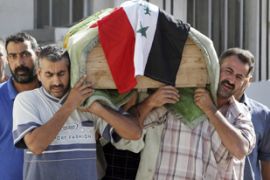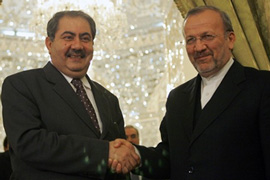UN: Iraq conceals casualty figures
UN report highlights sectarian fighting and questions Maliki’s human-rights record.

The report said: “The prime minister’s office told Unami that the mortality figures contained in the report were exaggerated, although they were in fact figures compiled and provided by a government ministry.
| Your Views | ||
|
“It was a matter of regret that the Iraqi government did not provide Unami with access to the ministry of health’s overall mortality figures for the reporting period.
“Unami emphasises again the utmost need for the Iraqi government to operate in a transparent manner and does not accept the government’s suggestion that Unami used the mortality figures in an inappropriate fashion.”
At a news conference on Wednesday in Baghdad to launch the latest report, Ivana Vuco, a UN human-rights officer, said: “These figures are probably the most carefully screened.
“Unofficially in follow-up meetings we were told that the government was concerned that people would misconstrue the figures to portray a grim situation.”
Iraqi reaction
The office of Nuri al-Maliki, the Iraqi prime minister, hit back at the UN mission and complained that its latest report lacked credibility.
It said: “Despite the Iraqi government’s full co-operation and transparency in dealing with the UN delegation in Iraq, much of the information contained in the report was not taken from credible sources,” it said.
“Considering the conditions which Iraq is currently enduring, this report calls into question the credibility of the UN office in Iraq, aggravating the humanitarian situation instead of resolving it.”
While being unable to provide statistics because of the government’s decision, the new report for the first quarter of 2007 said violence remained a serious problem in Iraq, despite a US and Iraqi security operation.
Sectarian violence
The Unami report said: “In February and March, sectarian violence claimed the lives of large numbers of civilians, including women and children, in both Shia and Sunni neighbourhoods.
“While government officials claimed an initial drop in the number of killings in the latter half of February following the launch of the Baghdad security plan, the number of reported casualties rose again in March.”
Iraqi and US officials insist the civilian death toll from Iraq‘s sectarian war has declined since the plan began on February 14, but refuse to release detailed figures to back up the assertion.
Unami said that “violent deaths were a regular feature of several other cities in the governorates of Nineveh, Salaheddin, Diyala and Babel” and not just Baghdad, the centre of the bloodshed.
Egypt talks
The conflict in Iraq will be discussed at an international meeting next week in Egypt drawing Iraq‘s neighbours as well as officials from the US and other countries.
|
|
|
The Iraq conference was the focus of talks between Zebari, left, and Mottaki [AFP] |
Iran, which attended a similar meeting in Baghdad last month, will decide soon whether to attend, Manouchehr Mottaki, Iran‘s foreign minister, has said.
He made the announcement during a joint news conference with Hoshiyar Zebari, his Iraqi counterpart, after talks in Tehran on Wednesday.
Zebari said: “We understand the position of the Islamic Republic of Iran and that it has not taken a final decision.”
For his part, al-Maliki said during a visit to Kuwait that he hoped Iran would attend.
Condoleezza Rice, US secretary of state, who will be at the meeting, said this week it would be a “missed opportunity” if Iran, which Washington accuses of fomenting violence in Iraq, stayed away.
Rice has said she would be prepared to speak to the Iranians on the sidelines of the conference but has made clear that discussions would be limited to Iraq and would not touch on Iran‘s sensitive nuclear programme.
